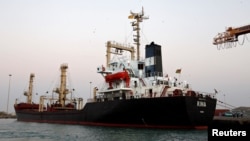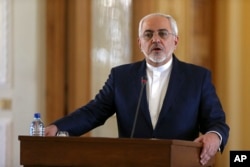Saudi Arabia said Wednesday that it would keep Yemen's Houthi rebel-controlled port of Hodeidah open to humanitarian deliveries for 30 days despite another rebel missile attack on Saudi territory.
"Keen to maintain humanitarian aid to the brotherly Yemeni people and as a result of intensified inspection measures, the coalition command announces that Hodeidah port will remain open," a statement said.
The Saudis also said four new cranes would be brought to the port to help unload ships.
The Saudi-led coalition trying to drive the Houthis out of Yemen imposed an air and sea blockade on the country last month after a missile attack on the Riyadh airport.
It eased the blockade on Hodeidah to let desperately needed food, fuel and medical supplies get to Yemeni civilians. But the port is still closed to commercial traffic, and relief workers said that's preventing aid from getting in.
The Saudis said the rebels were getting weapons through Hodeidah, but as pointed out in the coalition statement, ship inspections have intensified.
Meanwhile, Iranian Foreign Minister Mohammad Javad Zarif on Wednesday again took issue with what he called "baseless accusations" made by the United States that Tehran has been arming the Houthis.
Via state media, Zarif called the U.S. moves provocative and said U.S. officials were trying to "hide their support for the bombardment of the innocent Yemenis through such accusations."
Iran has admitted supporting the Houthis but has denied giving them weapons, including the missiles fired into Saudi Arabia. The U.S. supports the Saudi-led coalition.
The Trump administration has said it is "deeply disturbed by aggressive Houthi actions supported by Iran's provision of advanced weapons, which threaten regional security and prolong the Yemeni conflict."
It also says if Iran is sending missiles to Yemen, it would violate two international arms embargoes — one against the Houthis and one against Iran.
Last week at a military base in Washington, U.S. Ambassador to the U.N. Nikki Haley showed reporters what she said was debris from a short-range missile of Iranian origin recently fired by the Houthis into Saudi Arabia.
The Saudis say the rebels have shot more than 80 missiles into the country since it began airstrikes against the Houthis in 2015. The missiles have been intercepted and no damage has been reported.
The Saudi-led airstrikes have killed or wounded more than 14,000 civilians and wiped out entire neighborhoods. This misery comes on top of a looming famine in Yemen, a cholera epidemic, and a severe shortage of fuel to run generators to power hospitals and water treatment plants.
The Houthis seized the Yemeni capital of Sanaa in 2014, forcing internationally recognized President Abdu Rabu Mansour Hadi to flee to exile in Saudi Arabia.
He has since returned to the Yemeni port of Aden. The Houthis still control the capital and large parts of northern Yemen.
The power vacuum in Yemen has opened the door for extremists, including Islamic State, to set up bases in the country.







